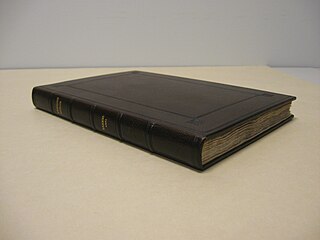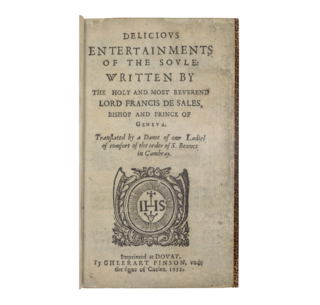
Lancelot Andrewes was an English bishop and scholar, who held high positions in the Church of England during the reigns of Elizabeth I and James I. During the latter's reign, Andrewes served successively as Bishop of Chichester, of Ely, and of Winchester and oversaw the translation of the King James Version of the Bible. In the Church of England he is commemorated on 25 September with a lesser festival.
Bhakti means "attachment, participation, fondness for, homage, faith, love, devotion, worship, purity". It was originally used in Hinduism, referring to devotion and love for a personal god or a representational god by a devotee. In ancient texts such as the Shvetashvatara Upanishad, the term simply means participation, devotion and love for any endeavor, while in the Bhagavad Gita, it connotes one of the possible paths of spirituality and towards moksha, as in bhakti marga.

Meric Casaubon, son of Isaac Casaubon, was a French-English classical scholar. He was the first to translate the Meditations of Marcus Aurelius into English.
The core of Prem Rawat's teaching is that the individual’s need for fulfillment can be satisfied by turning within to contact a constant source of peace and joy. Rather than a body of dogma, he emphasizes a direct experience of transcendence, which he claims is accessible through the four techniques of meditation which he teaches. He calls these techniques "Knowledge" and says that Knowledge will take "all your senses that have been going outside all your life, turn them around and put them inside to feel and to actually experience you."

Johannes Evangelista Gossner, German divine and philanthropist, was born at Hausen near Augsburg.

Elisabeth of the Palatinate, also known as Elisabeth of Bohemia, Princess Elisabeth of the Palatinate, or Princess-Abbess of Herford Abbey, was the eldest daughter of Frederick V, Elector Palatine, and Elizabeth Stuart. Elisabeth of the Palatinate was a philosopher best known for her correspondence with René Descartes. She was critical of Descartes' dualistic metaphysics and her work anticipated the metaphysical concerns of later philosophers.

The Christian ashram movement is a movement within Christianity in India that embraces Vedanta and the teachings of the East, attempting to combine the Christian faith with the Hindu ashram model and Christian monasticism with the Hindu sannyasa tradition.
Ecospirituality connects the science of ecology with spirituality. It brings together religion and environmental activism. Ecospirituality has been defined as "a manifestation of the spiritual connection between human beings and the environment." The new millennium and the modern ecological crisis has created a need for environmentally based religion and spirituality. Ecospirituality is understood by some practitioners and scholars as one result of people wanting to free themselves from a consumeristic and materialistic society. Ecospirituality has been critiqued for being an umbrella term for concepts such as deep ecology, ecofeminism, and nature religion.

Revelations of Divine Love is a medieval book of Christian mystical devotions. It was written between the 14th and 15th centuries by Julian of Norwich, about whom almost nothing is known. It is the earliest surviving example of a book in the English language known to have been written by a woman. It is also the earliest surviving work written by an English anchorite or anchoress.
Robin Hood's Golden Prize is Child ballad 147. It is a story in the Robin Hood canon which has survived as, among other forms, a late seventeenth-century English broadside ballad, and is one of several ballads about the medieval folk hero that form part of the Child ballad collection, which is one of the most comprehensive collections of traditional English ballads.
Robin Hood and the Bishop is number 143 in Francis James Child's collection of Child ballads, and describes an adventure of Robin Hood. This song has also survived as a late seventeenth-century English broadside ballad, and is one of several ballads about the medieval folk hero that form part of the Child ballad collection, which is one of the most comprehensive collections of traditional English ballads.

The Holy Sonnets—also known as the Divine Meditations or Divine Sonnets—are a series of nineteen poems by the English poet John Donne (1572–1631). The sonnets were first published in 1633—two years after Donne's death. They are written predominantly in the style and form prescribed by Renaissance Italian poet Petrarch (1304–1374) in which the sonnet consisted of two quatrains and a sestet. However, several rhythmic and structural patterns as well as the inclusion of couplets are elements influenced by the sonnet form developed by English poet and playwright William Shakespeare (1564–1616).

Drexel 4041 is a 17th-century British music manuscript commonplace book. As described by musicologist John P. Cutts, Drexel 4041 "is a treasure-house of early seventeenth-century song and dramatic lyric worthy of the attention of any student of seventeenth-century literature and drama." It is also a major source for the work of English composer William Lawes. Belonging to the New York Public Library, it forms part of the Drexel Collection, housed in the Music Division of the New York Public Library for the Performing Arts. Following traditional library practice, its name is derived from its call number.

Affective piety is most commonly described as a style of highly emotional devotion to the humanity of Jesus, particularly in his infancy and his death, and to the joys and sorrows of the Virgin Mary. It was a major influence on many varieties of devotional literature in late-medieval Europe, both in Latin and in the vernaculars. This practice of prayer, reading, and meditation was often cultivated through visualization and concentration on vivid images of scenes from the Bible, Saints' Lives, Virgin Mary, Christ and religious symbols, feeling from the result. These images could be either conjured up in people's minds when they read or heard poetry and other pieces of religious literature, or they could gaze on manuscript illuminations and other pieces of art as they prayed and meditated on the scenes depicted. In either case, this style of affective meditation asked the "viewer" to engage with the scene as if she or he were physically present and to stir up feelings of love, fear, grief, and/or repentance for sin.

The roles of women in Taoism have differed from the traditional patriarchy over women in ancient and imperial China. Chinese women had special importance in some Taoist schools that recognized their transcendental abilities to communicate with deities, who frequently granted women with revealed texts and scriptures. Women first came to prominence in the Highest Clarity School, which was founded in the 4th century by a woman, Wei Huacun. The Tang dynasty (618–907) was a highpoint for the importance of Daoist women, when one-third of the Shangqing clergy were women, including many aristocratic Taoist nuns. The number of Taoist women decreased until the 12th century when the Complete Perfection School, which ordained Sun Bu'er as the only woman among its original disciples, put women in positions of power. In the 18th and 19th centuries, women Taoists practiced and discussed nüdan, involving gender-specific practices of breath meditation and visualization. Furthermore, Taoist divinities and cults have long traditions in China, for example, the Queen Mother of the West, the patron of xian immortality, He Xiangu, one of the Eight Immortals, and Mazu, the protectress of sailors and fishermen.
Dinah Black, also known as Dinah the Moor and Dinah the Black, was a Black woman who lived in the English city of Bristol during the 17th century and was baptised as a Christian. Though historical information on her life is scarce, records show that she visited Baptist spiritualist Sarah Wight in London in 1647 and appeared in a case heard by the Bristol Court of Aldermen in July 1667 after escaping from a ship which was supposed to transport her to a plantation overseas.
Rose Thurgood was an English religious writer, known as the author of one of the earliest English conversion narratives, "A Lecture of Repentance" (1637/8).
Alice Sutcliffe, born Alice Woodhouse or Woodhows, was an English religious writer. Her only known literary work, Meditations of Man's Mortalitie, or, A Way to True Blessednesse, was first published in 1633.
"Sonnet II", also known by its opening words as "As Due By Many Titles", is a poem written by John Donne, who is considered to be one of the representatives of the metaphysical poetry in English literature. It was first published in 1633, two years after Donne’s death.

Pudentiana Deacon was a Benedictine nun now known for her translation of Les vrais entretiens spirituels by Francis de Sales (1557–1662).











